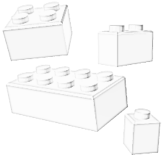|
|
|
|
| ShlWAPI.pas Version
1.08 Research |
||||||||||||||||||||
|
This topic outlines the reasons for the research conducted by SST on functions
implemented in, and exported by various versions of the Windows shell, light-weight, utility
dynamic link library, ShlWAPI.dll.
It also describes the methods applied in attaining the (intermediate) results described
in the functions' descriptions in our ShlWAPI.pas Developer Reference and as summarized in the ShlWAPI.dll Function Support table(s).
Background
Although translating a (large) C/C++*1 header file into a Delphi (Object Pascal) unit is generally
a tedious but straightforward task and when we ported the first versions of ShlWAPI.pas from
the then current versions of ShlWAPI.h this was no exception to the rule.
Unfortunately, starting with the header files that supported functions exported by the ShlWAPI.dlls
that shipped with certain Internet Explorer disitributions, things began to get increasingly confusing.
The cause for this confusion not being the changes/modifications
that were to be expected in the corresponding, updated, (ShlWAPI) header files, but
an increasing number of minor inconsistencies that were hard to grasp,
but resulted in further development of ShlWAPI.pas having to be temporarily discontinued,
in order to identify the problem(s).
Even though the inconsistencies were quickly found to be (mainly) discrepancies between the functions
being imported by our implementantion (of ShlWAPI.pas) and the functions actually exported by
ShlWAPI.dll, the underlying cause was more elusive,
because we initially ascribed the problems to our own work
and this proved unfounded.
The subsequently planned, more systematic review became in itself a problem, because, not only
was it forseeable that it would be hard to determine the point at which the problems had actually arisen,
but also, in that it raised the question which documentation and C/C++ header file version(s)
to use as the basis for the analysis (potentially, any or all might contain mistakes or omissions).
Mehtods
Particularly for the latter of the two aforementioned reasons,
it was unlikely that an analysis solely of the header files would render the cause(s).
Furthermore, without the ShlWAPI.dll builds' source code, and the export definition (.def)
files in particular, we were forced to start by resolving the former.
This meant, we would first have to determine
which functions are (really) exported by each of the various ShlWAPI.dll versions.
Subsequently, we could then merge and compare the results with
the functions that are/were officially documented and/or are/were declared in
a (Microsoft SDK) header file.
Apart from the work, neither task was (alt. is) particularly demanding,
but obtaining reliable results within a limited time frame
was not quite as easy as it (initially) appeared.
This was (mainly) due to the fact that the development tools*2
that were) at our disposal (at the time), such as the Microsoft SDK's Depends.exe,
facilitate copying exported functions' names, but only from one dll at a time.
The first step was therefore to devise a method,
by which a list could be compiled from an arbitrary number of text files,
each file containing the function names exported by one ShlWAPI.dll build/version,
but from which (any (alt. all)) duplicate names had been eliminated.
But, as each text file was likely to contain several hundred function names,
merging the names in even two or three (let alone five to ten, or more) files,
manually, to a (single) list (in which each name occurred only once,) would not only be
extremely time consuming, but also highly susceptible to mistakes.
The obvious answer (alt. solution) was to write a script or program that would perform this task.
ShlWAPI.pas Version 1.08 being a Delphi project and as the Delphi framework
(already) provided a class that was ideally suited for the purpose,
(alt. provided an ideal class for the purpose ...) we decided to do the latter.
With this list, we were now in a position
Thus, the only question that would remain (alt. remained) unanswered was that of
the functions that were exported only by ordinal.
Results
Results text
Summary
Summary text
|

|
||||||||||||||||||
|
Document/Contents version 1.00 Page/URI last updated on 11.12.2023 |
Copyright © Stoelzel Software Technologie (SST) 2010 - 2017 |
Suggestions and comments mail to: webmaster@stoelzelsoftwaretech.com |